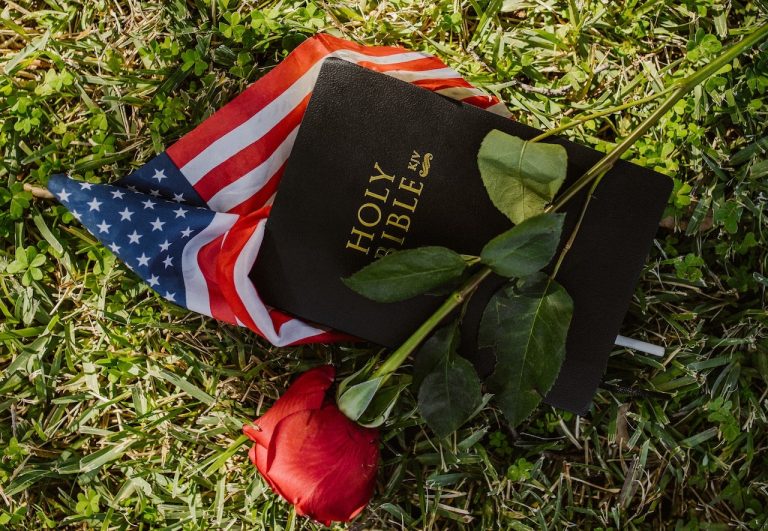By: Francesca D’Annunzio, Lauren Irwin and Janaé Bradford
Christian nationalism is having a moment.
The ideology and groups that espouse it aren’t new, but experts say it’s gained popularity since the 2020 election, the Jan. 6 Capitol insurrection and the COVID-19 pandemic.
Multiple high-profile politicians and candidates have echoed rhetoric associated with the ideology. Despite the rise in public displays of Christian nationalism, experts say it’s hard to categorize which groups fit the bill for it, as the landscape is quickly evolving.
Pew Research Center conducted a survey in March 2021 attempting to quantify Christian nationalists in the United States. The study showed that “roughly one-in-five say that the federal government should stop enforcing the separation of church and state (19%) and that the U.S. Constitution was inspired by God (18%). And 15% go as far as to say the federal government should declare the U.S. a Christian nation.”
Deseret News cited the center’s associate director of research, Gregory Smith, saying the team avoided using the term “Christian nationalism” in order to provide clear data about a complex ideology.
There is not a clear consensus on what Christian nationalism is and who subscribes to that ideology, experts said. The umbrella that is Christian nationalism can—and has—been expressed through pro-Christianity, political affiliation, anti-government views, anti-LGBTQ views, racism and antisemitism. These values have been expressed individually or in combination with one another, making it difficult to categorize the beliefs under a Christian nationalism definition.
Kari Lake, a Republican candidate who recently lost her race for Arizona governor, has not explicitly identified herself as a Christian nationalist — but she’s echoed rhetoric associated with the ideology.
“You can call us extremists. You can call us domestic terrorists. You know who else was called a lot of names his whole life? Jesus,” Lake said at a campaign rally in September.
Others have all but self-identified as Christian nationalists.
“I’m a Christian, and I say it proudly. We should be Christian nationalists,” Marjorie Taylor Greene, R-GA., said in an interview.
Lauren Boebert, R-Col., has made similar comments; she received cheers from supporters after saying she’s had “enough of this separation of church and state junk,” at a church service in Colorado. “The church is supposed to direct the government,” she said.
Both Greene and Boebert ran for reelection this fall along with many others who are labeled as extremist and Christian nationalists by the Anti-Defamation League or ADL.
Experts say that it’s hard to quantify the reach of Christian nationalists’ political and monetary influence.
“You are embarking on an impossible task,” said Frederick Clarkson, a researcher at Political Research Associates who studies Christian nationalism.
Quantifying Christian nationalists’ campaign finance contributions is difficult because many groups that espouse the ideology don’t self-identify as such, according to Rachel Carroll Rivas, a senior researcher at the Southern Poverty Law Center.
Individuals and groups that espouse Christian nationalist ideologies are contributing to political causes and organizations nationwide, experts like Clarkson and Rivas say. However, there’s not an existing directory of names or groups to search for. Reporters and researchers cannot open campaign finance records and search for donations from a list of PACs that self-identify with Christian nationalist ideals.
“I would say that we’re actually not in a place right now where we’re specifically labeling groups with this,” Rivas said. “Partly because I think we are really thinking about this as a phenomenon and the set of ideas and something that’s impacting the hard right movement and not as a specific label to certain groups.”
Although it’s challenging to quantify the financial influence Christian nationalists’ had in the 2022 elections, reporters can still examine the immediate and sustained actions taken by groups following this year’s election results in preparation for the 2024 election coverage. Below are some resources journalists can turn to—and keep an eye on—over the next two years.
Resources and tips
Carefully define your terms.
Clarkson, the researcher at Political Research Associates, said reporters need to define their terms and maintain a consistent application of that definition. Some reporters have opted to use the term “extremist” to avoid labeling groups — but Clarkson said that’s too vague and does not serve readers.
“There’s no wiggling out of it,” he said. “It’s the biggest failure in American journalism in this area.”
When writing about entities that espouse Christian nationalist ideology, reporters should consult with researchers who specialize in this area.
“As journalists, it’s really important to give context and that’s all I can really say,” said Marilyn Mayo, a senior researcher at the ADL. “It’s really hard in this day and age, like every journalist is dealing with this. How do you be objective without bending to one side or the other? And so I think, the only way to do that is to basically give context to whatever you’re saying, and a citation and say, ‘this is what this person means or when they say this,’ or something like that.”
Look for these names on campaign finance reports.
Check with organizations that study extremism to see if they are looking into groups in your coverage area. The ADL is currently tracking politicians who ran in the 2022 election that have expressed extreme views and actions.
On a national level, the Southern Poverty Law Center maintains a map of hate groups. The SPLC doesn’t maintain a published list online of Christian nationalist groups, but some of the organizations it tracks espouse Christian nationalist ideology. The SPLC is expected to release a report on Christian nationalism and extremism later this year.
Here is a non-comprehensive list of names you can look for on campaign finance reports:
- Patriot Mobile, a right-wing Christian cell phone company that has funded suburban school board races in the Dallas-Fort Worth metroplex.
- The 1776 Project, a national organization that funds school board trustee candidates who promote “patriotism and pride in American history.”
- Restoration PAC, a political action committee that wants to restore what it considers to be America’s foundation: God, family, education and community. The organization is largely funded by Richard Uihlein, a billionaire who bankrolls election deniers.
- The American Principles Project is a Washington D.C.-based political action committee with goals to intervene in campaigns and elections to influence pro-family values. APP targets both left-leaning views, Black Lives Matter, Marxist views and Joe Biden on their website. They ask for $25 a year to become a “Big Family” member and support their practices.
- Moms for Liberty is a non-profit organization designed to empower parents to defend and advocate for their parental rights at all levels of government, their website said. Their “Parent Pledge” instructs parents to be involved in their children’s education, medical care and moral upbringing through action at the governmental level.
- Christians Engaged is a tax-exempt organization based in Texas that inspires people to pray for the fate of the country, vote in every election and engage in classes and seminars with the Christian nationalist community to educate each other about Christianity’s involvement in American politics. Their donation programs range from supporters giving $1,500 a year to motivators giving $25,000 a year to help fund their events and projects.
- Billy Graham Evangelistic Association is a 72-year-old organization that aims to implement Christianity in all aspects of life; they even released an election guide in Decision magazine to help people learn about Christian candidates’ stances on controversial topics. Their political involvement resulted in the IRS reclassifying them as an association of churches in 2016.
Keep an eye out for events
Groups that espouse Christian nationalist ideals also organize community events that reporters can look for.
For example, Clay Clark, a podcast host and entrepreneur, began to tour across the country with other right-wing politicians and activists setting up shop in churches in primarily Republican areas.
The ReAwaken America tours, along with other far-right conventions, examine narratives targeting them and garner support for their Christian nationalism ideologies. These gatherings generate and perpetuate conspiracy theories, according to Mayo.
You can find the conference and events that were tracked by the ADL in 2021.
If you notice political activity in religious institutions in your coverage area, consider reporting it to ProPublica.
Federal law prohibits religious institutions from direct engagement in political activity.
That doesn’t mean the Internal Revenue Service enforces the rules, though.
ProPublica and The Texas Tribune are trying to understand how these rules are enforced — or not. They want examples from across the political spectrum.
To report examples of political activity in houses of worship in your coverage area, you can send a tip to Texas Tribune/ProPublica reporters here.













